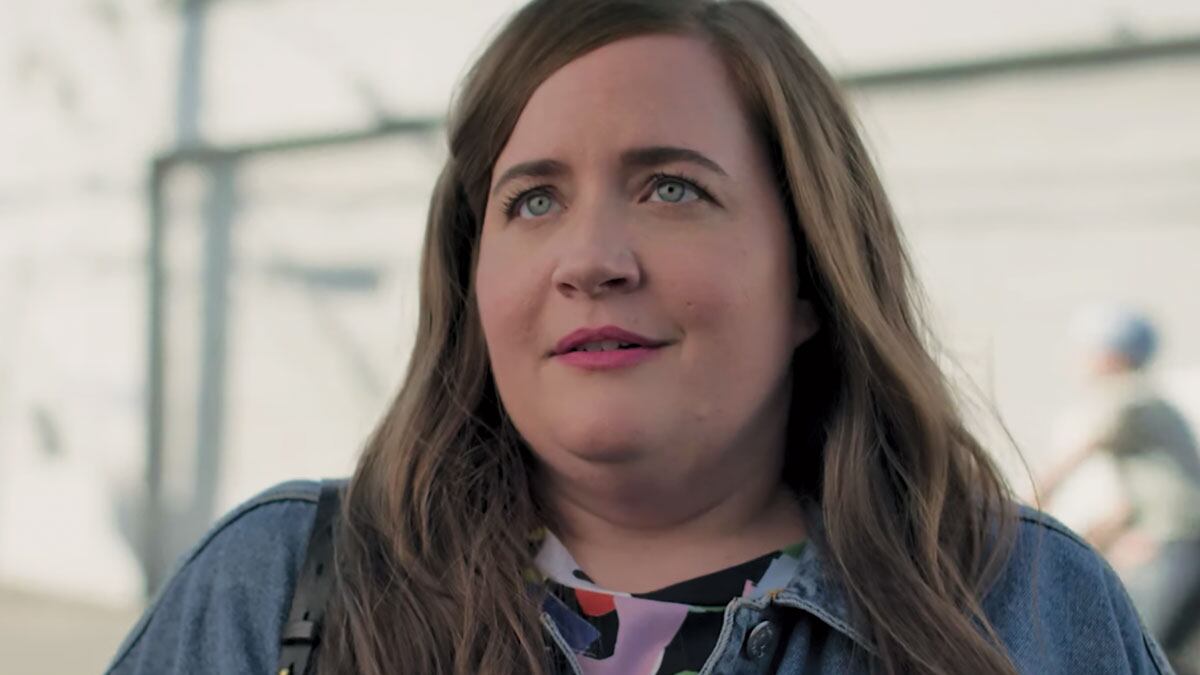When we last saw Aidy Bryant's heroine Annie in Shrill, she had just thrown a flower pot through the windshield of an internet troll who body-shamed her throughout the first season of the Portland-set series. The sophomore season begins right where the last one left off: Annie barges into the home of her boyfriend Ryan (Luka Jones) after fleeing the scene and triumphantly yells, "I'm a fucking bitch, and I love it!"
It's a moment that seems to continue the character's growing empowerment, which kicked off the first six episodes. Following that declaration, the couple borrows a car, revs off to the nearest campground, and then—not unreasonably—asks what's supposed to happen next.
"You're not running away from anything," Ryan insists. "You're running toward yourself!"
But that's where the bold, feminist perspective ends. For a series that made waves with the Fat Babe Pool Party episode, the near-complete absence of size politics in the eight latest installments, which debuted on Hulu in late January, comes as a surprise. No matter how desperately some viewers may wish to cobble together a mission statement out of Annie's Season 2-opening tirade, the show presents her as a tireless avatar of enviable decency—her fatness is a mere afterthought.
To some degree, a shift in tone should have been expected. The freshman season was based on writer Lindy West's memoir Shrill: Notes From a Loud Woman, which examined fat-based discrimination plaguing everything from her love life to her career. Left to navigate plot points without circumstances laid down by the source text, the show largely abandons the topic of Annie's weight, perhaps to illustrate that the character shouldn't be solely defined by it. While this may represent a cultural victory, the sudden withdrawal of a unifying theme renders its disparate elements all the more jumbled, and at times leaves Annie as the least compelling part of Shrill.
Though no longer even vaguely bound by West's signposts, Season 2 maintains the feel of a memoir nonetheless. One delightful development is added space to flesh out the characters of Annie's mom Vera (Julia Sweeney), dad Bill (Daniel Stern), and beloved roomie Fran (Lolly Adefope), while each is situated in his or her own corner of an all-too-recognizable cityscape. If so many locally filmed, post-Portlandia productions trip over themselves scouting out aspirational kitsch, Shrill somehow makes our fair town appear less adorable than usual. For better or worse—from the cast-off furniture to the soiled slacker garments—the show's portrayal of our lumpen bohemia resonates. Moreover, Shrill's delight in cataloguing Puddletown weirdness, both real and imagined—visitors should find naked bike rides more prevalent than ketamine binges at the Oaks Park Roller Skating Rink—never seems to get old.
However disjointed the eight new episodes may be, a devoted fan base should guarantee we'll see more of Annie's story. As journeys of self-discovery go, nobody could ever accuse Shrill of running toward itself, but some series may best be left to the leisurely stroll.
SEE IT: Shrill Season 2 streams on Hulu.
